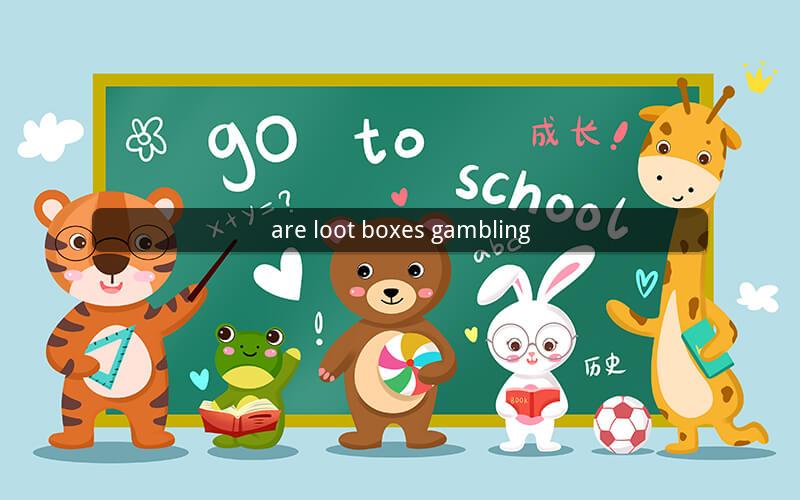
Are Loot Boxes Gambling?
Table of Contents
1. Introduction to Loot Boxes
2. Understanding Gambling
3. The Debate Over Loot Boxes
4. The Psychological Aspect of Loot Boxes
5. The Legal Perspective on Loot Boxes
6. The Impact on the Gaming Industry
7. The Role of Regulation
8. The Public's Perception
9. The Future of Loot Boxes
10. Conclusion
1. Introduction to Loot Boxes
Loot boxes, also known as randomized reward systems, have become an integral part of the modern gaming industry. These virtual containers contain a random assortment of items, ranging from cosmetic enhancements to in-game currency and exclusive content. Players purchase these boxes with real money, hoping to acquire rare and valuable rewards.
2. Understanding Gambling
Gambling is defined as the act of betting on an event with an uncertain outcome, with the primary intent of winning money or material goods. It involves risk, reward, and the element of chance. Common forms of gambling include casino games, sports betting, and lottery games.
3. The Debate Over Loot Boxes
The debate over whether loot boxes constitute gambling has been ongoing for several years. Proponents argue that the element of chance and the potential for financial gain make loot boxes akin to gambling. Critics, however, contend that the purchase of loot boxes is a form of entertainment and not a gambling activity.
4. The Psychological Aspect of Loot Boxes
The psychological appeal of loot boxes lies in the anticipation and excitement of discovering new items. This psychological phenomenon is similar to the thrill of opening a lottery ticket or a surprise gift. The element of chance creates a sense of thrill and keeps players engaged.
5. The Legal Perspective on Loot Boxes
The legal status of loot boxes varies by country. In some jurisdictions, such as Belgium and the Netherlands, loot boxes are classified as gambling and are subject to strict regulations. In other countries, like the United States, the classification remains unclear, leading to differing interpretations among game developers and regulatory bodies.
6. The Impact on the Gaming Industry
Loot boxes have had a significant impact on the gaming industry. They have generated substantial revenue for developers and publishers, with some games generating millions of dollars through loot box sales. However, they have also raised concerns about the potential for addiction and the exploitation of vulnerable players.
7. The Role of Regulation
Regulatory bodies around the world are increasingly scrutinizing loot boxes and their impact on the gaming industry. Some countries have implemented measures to ensure that loot boxes are not misleading or deceptive, while others are considering outright bans.
8. The Public's Perception
Public opinion on loot boxes is divided. Some consumers view them as a convenient way to enhance their gaming experience, while others are concerned about the potential for addiction and the ethical implications of monetizing chance.
9. The Future of Loot Boxes
The future of loot boxes remains uncertain. As more countries implement regulations and public awareness grows, it is likely that the gaming industry will have to adapt its approach to loot boxes. Developers may need to consider alternative monetization strategies that are less controversial and more ethically sound.
10. Conclusion
The question of whether loot boxes constitute gambling is a complex one. While they share some similarities with traditional gambling activities, the lack of a clear legal framework and the psychological appeal of loot boxes make it difficult to draw a definitive conclusion. As the gaming industry continues to evolve, it is essential that developers, regulators, and consumers work together to ensure that loot boxes are used responsibly and ethically.
Questions and Answers
1. What is a loot box?
- A loot box is a virtual container that contains a random assortment of items, purchased with real money, with the hope of acquiring rare and valuable rewards.
2. Are loot boxes legal in all countries?
- No, the legality of loot boxes varies by country. Some countries, like Belgium and the Netherlands, have classified them as gambling and implemented strict regulations.
3. What are the potential risks of loot boxes?
- The potential risks include addiction, financial loss, and the exploitation of vulnerable players.
4. How do loot boxes generate revenue for game developers?
- Loot boxes generate revenue through the sale of random items to players, often with the hope of acquiring rare and valuable rewards.
5. What is the psychological appeal of loot boxes?
- The psychological appeal lies in the anticipation and excitement of discovering new items, similar to the thrill of opening a surprise gift.
6. How do regulators determine if loot boxes are gambling?
- Regulators consider factors such as the element of chance, the potential for financial gain, and the intent of the activity to determine if loot boxes constitute gambling.
7. What is the role of public opinion in the debate over loot boxes?
- Public opinion is crucial in shaping the debate over loot boxes, as it influences regulatory decisions and the behavior of game developers.
8. How can developers ensure that loot boxes are used responsibly?
- Developers can ensure responsible use by providing clear information about the odds of obtaining rare items, limiting the number of loot boxes available, and implementing measures to prevent addiction.
9. What are some alternative monetization strategies to loot boxes?
- Alternative strategies include subscriptions, in-game purchases of items without a random element, and partnerships with other companies for exclusive content.
10. What is the future of loot boxes in the gaming industry?
- The future of loot boxes is uncertain, but it is likely that the gaming industry will have to adapt to new regulations and public concerns, potentially leading to a shift in monetization strategies.